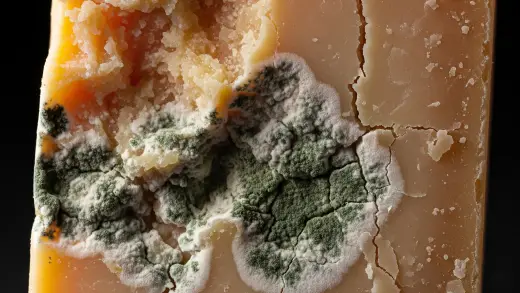Cheese curds should only be left out for 24 hours after they are made. After that, they should be kept in the refrigerator to maintain their quality and prevent spoilage.
While they might still be edible for a short time longer, their texture and flavor will start to deteriorate. For the best taste and experience, you must refrigerate them as soon as possible.

Introduction for How Long Can Cheese Curds Stay Unrefrigerated?
Cheese curds, those delightful, chewy, and flavorful morsels, are a beloved dairy delight enjoyed by many. They are essentially the fresh, unaged form of cheese, created by cutting the curd from the milk and draining off the whey.
While they are delicious on their own, they are often served fried, baked, or as a topping for various dishes.
Despite their popularity, it’s crucial to handle cheese curds with care to ensure their quality and safety.
One of the most important factors to consider is proper storage. Leaving cheese curds unrefrigerated for too long can lead to spoilage and compromise their taste and texture.
The Perils of Unrefrigerated Cheese Curds: Is It Safe?
While cheese curds are a delicious treat, leaving them unrefrigerated for extended periods can pose significant risks.
Spoilage Risks
Cheese curds are a breeding ground for bacteria, especially when left at warm temperatures.
These bacteria can cause spoilage, leading to unpleasant odors, off-flavors, and potentially harmful toxins. The warmer the environment, the faster the spoilage process.
Texture and Flavor Changes
Even if cheese curds don’t spoil, leaving them unrefrigerated can still negatively impact their texture and flavor.
The curds may become dry, crumbly, or overly soft. Additionally, the cheese’s natural flavors may degrade or become distorted.
Health Concerns
Consuming spoiled cheese curds can pose health risks. Bacteria can produce toxins that can cause food poisoning, leading to symptoms like nausea, vomiting, diarrhea, and abdominal cramps.
It’s essential to prioritize food safety and avoid consuming any cheese curds that show signs of spoilage.

How to know when cheese curds are bad?
Cheese curds, a delightful and creamy dairy treat, are often enjoyed fresh and tangy. However, like any food, they can spoil if not handled or stored properly. Here’s a guide to help you determine if your cheese curds have gone bad:
1. Check the Expiration Date
Always prioritize checking the expiration date on the package. This is the most reliable indicator of freshness.
2. Look for Mold
Mold can appear as fuzzy, colored patches on the surface of the cheese curds. If you notice any mold, discard the entire package.
3. Smell the Curds
A sour or off-putting odor is a strong sign of spoilage. Fresh cheese curds should have a tangy, slightly acidic scent.
4. Examine the Texture
Bad cheese curds often become sticky, slimy, or dry. Fresh curds should have a firm yet slightly soft texture.
5. Taste Test (with Caution)
If you’re unsure, take a small taste. If the flavor is sour, bitter, or unpleasant, discard the curds.
A Safe Storage Solution: How to Keep Cheese Curds Fresh
To ensure the longevity and quality of your cheese curds, it’s essential to store them properly.
Refrigerating Cheese Curds
The most effective way to store cheese curds is in the refrigerator. This helps to slow down bacterial growth and maintain their freshness. Place the curds in an airtight container or wrap them tightly in plastic wrap to prevent them from drying out.

Freezing Options
If you want to store cheese curds for a longer period, freezing is a viable option. Place the curds in a freezer-safe container or bag, ensuring they are tightly sealed to prevent freezer burn. Frozen cheese curds can be stored for up to 3 months.
When ready to use, thaw the curds in the refrigerator overnight. Avoid thawing them at room temperature, as this can promote bacterial growth.
Best Practices for Storage
- Consume promptly: For the best flavor and texture, consume cheese curds within a few days of purchase.
- Check for spoilage: Regularly inspect cheese curds for any signs of spoilage, such as mold, slimy texture, or unpleasant odors.
- Avoid cross-contamination: Use clean utensils and surfaces to prevent cross-contamination with other foods.
By following these storage guidelines, you can enjoy fresh and delicious cheese curds for a longer period.
FAQs
Do Wisconsin cheese curds need to be refrigerated?
Yes, Wisconsin cheese curds need to be refrigerated to maintain their freshness and prevent spoilage.
How long can you leave cheese unrefrigerated before it goes bad?
Cheese should not be left unrefrigerated for more than two hours. This is a general guideline, and the specific time may vary depending on factors like temperature and humidity.
Is it safe to eat food left out for 4 hours?
No, it is generally not safe to eat food left out for 4 hours. Bacteria can multiply rapidly at room temperature, increasing the risk of foodborne illness.
What cheeses do not need refrigeration?
Hard cheeses like Parmesan, cheddar, and Swiss do not typically need refrigeration. They have a lower moisture content, making them less susceptible to spoilage. However, once opened, they should be stored in the refrigerator to prevent mold growth.
Conclusion
So, how long can cheese curds stay unrefrigerated? As a general rule, it’s best to refrigerate them as soon as you get them home.
Leaving them out for more than a couple of hours can increase the risk of bacteria growth. Remember, food safety is important, so always err on the side of caution. If you’re unsure, it’s better to throw them out than risk getting sick.















